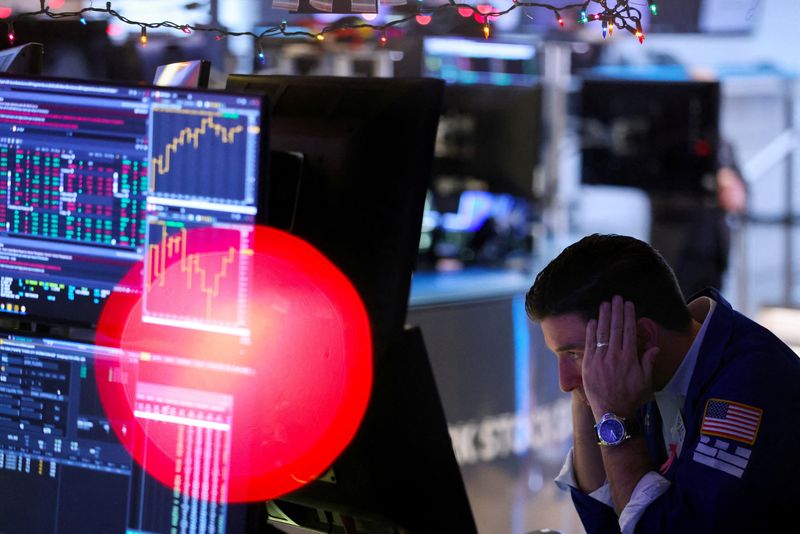A look at the day ahead in U.S. and global markets from Mike Dolan.
Of all the financial surprises of 2022, the Bank of Japan's decision to finally join its G7 peers in effectively tightening borrowing rates is up there with the shocks of the year - in its timing at least.
In the last major central bank set-piece of the year, the BOJ raised its long-standing cap on 10-year Japanese government bond yields by quarter of a percentage point to 0.5% - sending those yields and the yen surging and squeezing stocks further.
With inflation numbers due this week expected to show price rises creeping to near twice the BOJ's 2% target, there had been reports and speculation in recent days that a change of the central bank's super-easy policy was in the works. Yet most investors felt that was only likely when BOJ chief Haruhiko Kuroda stepped down in April.
Thursday's move was presented in an ambiguous way - with Kuroda stressing that 10-yield target remained at zero and all that had changed was a widening of the permitted trading band around that to 0.5 percentage point from 0.25 previously. It was a technical shift to improve market functioning, he insisted.
But as 10-yields had been pressing on the ceiling of the previous band, they just moved instantly to the new cap. Most analysts see this as the start of a gradual tightening process.
"Despite the denials, we think Governor Kuroda is trying to pave the way for policy normalisation before stepping down," ING economist Min Joo Kang said after the decision.
Japan's 10-year bond yields immediately almost doubled close to the new 0.5% target, with U.S. Treasury and European sovereign debt yields rising in their slipstream. Ten and 30-year Treasury yields rose to their highest levels of the month.
The yen soared almost 4% against the dollar, euro and sterling. The dollar/yen exchange rate dropped almost 3.5% from Monday's New York close to its lowest since August - some 13% down from the year's peaks in October, when the BOJ was forced to intervene to buy yen on the open markets to halt its slide.
Japan's Nikkei 225 stock index plunged 2.5% to its lowest level in two months, with stock markets across Asia down about 1%. European stocks and U.S. futures were both in the red.
Why the shock? Apart from the timing, the BOJ move marks a significant moment in draining the world economy of central bank liquidity pumped in to support economies during the pandemic.
Even though central banks in the United States, Europe, Canada and Australia and elsewhere have been raising interest rates and reducing balance sheets all year, China and Japan - the world's second and third biggest economies - have leaned the other way and kept topping up the global liquidity bowl.
While Thursday's BOJ action might actually see it buy even more bonds initially to maintain its new cap, the beginning of the end of its uber-loose monetary stance would be significant to that global liquidity pool and the behaviour of Japanese investors in world markets.
Continued concern about the extent of China's COVID battle and surging new cases may mean the People's Bank of China remains the only dove in the coop, however. It held its benchmark lending rate unchanged for the 4th straight month on Thursday.
China's Xiaomi (OTC:XIACF) started laying off workers in its smartphone and internet services business, joining a long list of Chinese tech firms cutting jobs as the country battles the outbreaks.
Back in the United States, housing gloom dominates. With home builder sentiment down for a 12th month in a row this month, Tuesday's focus will be on housing starts.
Underlying corporate soundings and fears of an earnings recession - at least when you exclude big energy companies and their surprise 2022 windfall - also come back on the radar with updates from FedEx (NYSE:FDX) and Nike (NYSE:NKE) later. The former is often seen as a bellwether for global activity, trade and shipping.
U.S. budget wrangling was also in focus. Negotiators in the U.S. Congress unveiled a $1.7 trillion government funding bill late on Monday, as lawmakers scrambled to pass the measure, which includes record military spending, before temporary funding runs out at the week's end.
In politics, the House of Representatives panel probing the Jan. 6, 2021, attack on the Capitol asked federal prosecutors on Monday to charge Donald Trump with four crimes for his role in sparking the deadly riot.
In the ailing crypto world, questions about the health of major exchange Binance dominate amid the messy collapse of FTX and the fate of its founder.
Key developments that may provide direction to U.S. markets later on Tuesday:
* U.S. Nov housing starts, permits;

* Philadelphia Fed's Dec non-manufacturing business survey
* U.S. corporate earnings: FedEx, Nike, Factset, General Mills (NYSE:GIS)
(By Mike Dolan, editing by Alexander Smith mike.dolan@thomsonreuters.com. Twitter: @reutersMikeD)